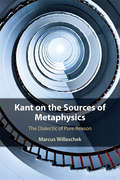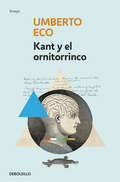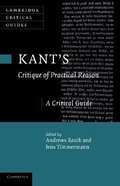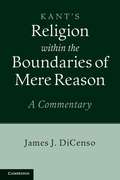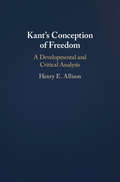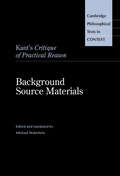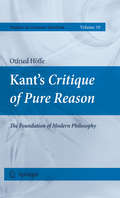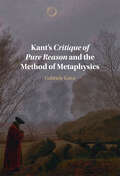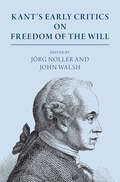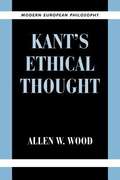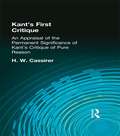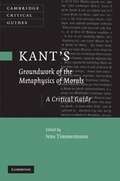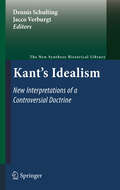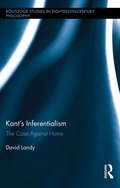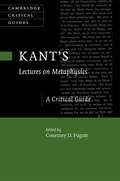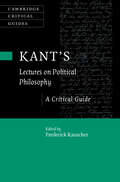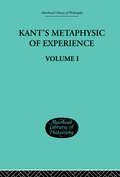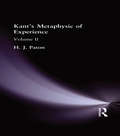- Table View
- List View
Kant on the Sources of Metaphysics: The Dialectic of Pure Reason
by Marcus WillaschekIn the Critique of Pure Reason, Kant famously criticizes traditional metaphysics and its proofs of immortality, free will and God's existence. What is often overlooked is that Kant also explains why rational beings must ask metaphysical questions about 'unconditioned' objects such as souls, uncaused causes or God, and why answers to these questions will appear rationally compelling to them. In this book, Marcus Willaschek reconstructs and defends Kant's account of the rational sources of metaphysics. After carefully explaining Kant's conceptions of reason and metaphysics, he offers detailed interpretations of the relevant passages from the Critique of Pure Reason (in particular, the 'Transcendental Dialectic') in which Kant explains why reason seeks 'the unconditioned'. Willaschek offers a novel interpretation of the Transcendental Dialectic, pointing up its 'positive' side, while at the same time it uncovers a highly original account of metaphysical thinking that will be relevant to contemporary philosophical debates.
Kant y el ornitorrinco (Palabra En El Tiempo Ser. #Vol. 265)
by Umberto EcoEsta obra constituye el complemento definitivo a los estudios semióticos de Eco y es una exaltación de la filosofía como arte del pensamiento y como indagación de las eternas dudas del hombre. En este ensayo de Umberto Eco, filosofía y semiótica se aúnan para analizar los mecanismos de percepción del hombre. ¿Por qué reconocemos a un gato como tal? ¿Por qué hemos acordado denominarlo de este modo? A partir de estas preguntas, Eco retoma una serie de aspectos que no se trataron con profundidad suficiente en su Tratado de semiótica general. Para ello, recoge y estudia fábulas protagonizadas por animales en las que el funcionamiento del sentido común juega un papel decisivo. Y entre todos los animales, el ornitorrinco adquiere un relieve especial, pues parece concebido para poner en crisis las teorías del conocimiento. Reseña:«De forma concisa, intelectualmente agresiva y lúcidamente incisiva, Eco pone sobre la mesa cuestiones fundamentales de la filosofía, la lingüística y la semiótica.»Kirkus Reviews
Kant'S Critique of Practical Reason
by Jens Timmermann Andrews ReathThe Critique of Practical Reason is the second of Kant's three Critiques, and his second work in moral theory after the Groundwork of the Metaphysics of Morals. Its systematic account of the authority of moral principles grounded in human autonomy unfolds Kant's considered views on morality and provides the keystone to his philosophical system. These new essays shed light on the principal arguments of the second Critique and explore their relation to Kant's critical philosophy as a whole. They examine the genesis of the Critique, Kant's approach to the authority of the moral law given as a 'fact of reason', the metaphysics of free agency, the account of respect for morality as the moral motive, and questions raised by the 'primacy of practical reason' and the idea of the 'postulates'. Engaging and critical, this volume will be invaluable to advanced students and scholars of Kant and to moral theorists alike.
Kant'S Metaphysics of Morals
by Lara DenisImmanuel Kant's Metaphysics of Morals (1797), containing the Doctrine of Right and Doctrine of Virtue, is his final major work of practical philosophy. Its focus is not rational beings in general but human beings in particular, and it presupposes and deepens Kant's earlier accounts of morality, freedom, and moral psychology. In this volume of newly-commissioned essays, a distinguished team of contributors explores the Metaphysics of Morals in relation to Kant's earlier works, as well as examining themes which emerge from the text itself. Topics include the relation between right and virtue, property, punishment, and moral feeling. Their diversity of questions, perspectives and approaches will provide new insights into the work for scholars in Kant's moral and political theory.
Kant'S Religion within the Boundaries of Mere Reason
by James J. DicensoKant's Religion within the Boundaries of Mere Reason is one of the great modern examinations of religion's meaning, function and impact on human affairs. In this volume, the first complete English-language commentary on the work, James J. DiCenso explains the historical context in which the book appeared, including the importance of Kant's conflict with state censorship. He shows how the Religion addresses crucial Kantian themes such as the relationship between freedom and morality, the human propensity to evil, the status of historical traditions in relation to ethical principles, and the interface between individual ethics and social institutions. The major arguments are clearly and precisely explained, and the themes are highlighted and located within Kant's mature critical philosophy, especially his ethics. The commentary will be valuable for all who are interested in the continuing relevance of religion for contemporary inquiries into ethics, public institutions and religious traditions.
Kant's Anatomy of Evil
by Sharon Anderson-Gold Pablo MuchnikKant infamously claimed that all human beings, without exception, are evil by nature. This collection of essays critically examines and elucidates what he must have meant by this indictment. It shows the role which evil plays in his overall philosophical project and analyses its relation to individual autonomy. Furthermore, it explores the relevance of Kant's views for understanding contemporary questions such as crimes against humanity and moral reconstruction. Leading scholars in the field engage a wide range of sources from which a distinctly Kantian theory of evil emerges, both subtle and robust, and capable of shedding light on the complex dynamics of human immorality.
Kant's Conception of Freedom: A Developmental and Critical Analysis
by Henry E. AllisonAlthough a good deal has been written about Kant's conception of free will in recent years, there has been no serious attempt to examine in detail the development of his views on the topic. This book endeavours to remedy the situation by tracing Kant's thoughts on free will from his earliest discussions of it in the 1750s through to his last accounts in the 1790s. This developmental approach is of interest for at least two reasons. First, it shows that the path that led Kant to view freedom as a transcendental power that is both radically distinct from and compatible with the causality of nature was a winding one. Second, it indicates that, despite the variety of views of free will that Kant held at various times, the concept occupied a central place in his thought, because it was the point of union between his theoretical and practical philosophy.
Kant's Construction of Nature
by Michael FriedmanKant's Metaphysical Foundations of Natural Science is one of the most difficult but also most important of Kant's works. Published in 1786 between the first (1781) and second (1787) editions of the Critique of Pure Reason, the Metaphysical Foundations occupies a central place in the development of Kant's philosophy, but has so far attracted relatively little attention compared with other works of Kant's critical period. Michael Friedman's book develops a new and complete reading of this work and reconstructs Kant's main argument clearly and in great detail, explaining its relationship to both Newton's Principia and eighteenth-century scientific thinkers such as Euler and Lambert. By situating Kant's text relative to his pre-critical writings on metaphysics and natural philosophy and, in particular, to the changes Kant made in the second edition of the Critique, Friedman articulates a radically new perspective on the meaning and development of the critical philosophy as a whole.
Kant's Critique of Practical Reason: Background Source Materials (Cambridge Philosophical Texts in Context)
by Michael WalschotsKant did not initially intend to write the Critique of Practical Reason, let alone three Critiques. It was primarily the reactions to the Critique of Pure Reason and the Groundwork of the Metaphysics of Morals that encouraged Kant to develop his moral philosophy in the second Critique. This volume presents both new and first-time English translations of texts written by Kant's predecessors and contemporaries that he read and responded to in the Critique of Practical Reason. It also includes several subsequent reactions to the second Critique. Together, the translations in this volume present the Critique of Practical Reason in its full historical context, offering scholars and students new insight into Kant's moral philosophy. The detailed editorial material appended to each of the eleven chapters helps introduce readers to the life and works of the authors, outlines the texts translated, and points to relevant passages across Kant's works.
Kant's Critique of Pure Reason
by Otfried HöffeKant's "Critique of Pure Reason" is so outstanding among modern philosophical works, that it can be termed "the" foundation of modern philosophy. Schopenhauer termed it "the most important book ever to have been written in Europe." Otfried Höffe guides the reader through the "Critique" one step at a time, expounding Kant's thoughts, submitting them to an interpretation and drawing a summary conclusion, placing the work and its topics within the context of its modern successors. A "critical" interpretation of Kant's text reveals that he had something to say on many discussions that are said to have originated after his death. Reducing his argumentation to its central tenets, it can be made stronger and applicable to current problems. Kant's eventual concern, however, even when writing theoretical philosophy, lay with the practical. Elaborating this concern and its connection to Kant's theoretical philosophy is a prime tenet of this book.
Kant's Critique of Pure Reason and the Method of Metaphysics
by Gabriele GavaIn two often neglected passages of the Critique of Pure Reason, Kant submits that the Critique is a 'treatise' or a 'doctrine of method'. These passages are puzzling because the Critique is only cursorily concerned with identifying adequate procedures of argument for philosophy. In this book, Gabriele Gava argues that these passages point out that the Critique is the doctrine of method of metaphysics. Doctrines of method have the task of showing that a given science is indeed a science because it possesses 'architectonic unity' – which happens when it realizes the 'idea' of a science. According to Gava's novel approach, the Critique establishes that metaphysics is capable of this unity, and his reading of the Critique from this perspective not only illuminates the central role of the Transcendental Doctrine of Method within it, but also clarifies the relationship between the different parts of the work.
Kant's Defense of Common Moral Experience
by Jeanine GrenbergIn this book, Jeanine Grenberg argues that everything important about Kant's moral philosophy emerges from careful reflection upon the common human moral experience of the conflict between happiness and morality. Through careful readings of both the Groundwork and the Critique of Practical Reason, Grenberg shows that Kant, typically thought to be an overly technical moral philosopher, in fact is a vigorous defender of the common person's first-personal encounter with moral demands. Grenberg uncovers a notion of phenomenological experience in Kant's account of the fact of reason, develops a new a reading of the fact, and grants a moral epistemic role for feeling in grounding Kant's a priori morality. The book thus challenges readings which attribute only a motivational role to feeling; and Fichtean readings which violate Kant's commitments to the limits of reason. This study will be valuable to students and scholars engaged in Kant studies.
Kant's Early Critics on Freedom of the Will
by John Walsh Jörg NollerThis book offers translations of early critical reactions to Kant's account of free will. Spanning the years 1784-1800, the translations make available, for the first time in English, works by little-known thinkers including Pistorius, Ulrich, Heydenreich, Creuzer and others, as well as familiar figures including Reinhold, Fichte and Schelling. Together they are a testimony to the intense debates surrounding the reception of Kant's account of free will in the 1780s and 1790s, and throw into relief the controversies concerning the coherence of Kant's concept of transcendental freedom, the possibility of reconciling freedom with determinism, the relation between free will and moral imputation, and other arguments central to Kant's view. The volume also includes a helpful introduction, a glossary of key terms and biographical details of the critics, and will provide a valuable foundation for further research on free will in post-Kantian philosophy.
Kant's Empirical Psychology
by Patrick R. FriersonThroughout his life, Kant was concerned with questions about empirical psychology. He aimed to develop an empirical account of human beings, and his lectures and writings on the topic are recognizable today as properly 'psychological' treatments of human thought and behavior. In this book Patrick R. Frierson uses close analysis of relevant texts, including unpublished lectures and notes, to study Kant's account. He shows in detail how Kant explains human action, choice, and thought in empirical terms, and how a better understanding of Kant's psychology can shed light on major concepts in his philosophy, including the moral law, moral responsibility, weakness of will, and cognitive error. Frierson also applies Kant's accounts of mental illness to contemporary philosophical issues. His book will interest students and scholars of Kant, the history of psychology, philosophy of psychology, and philosophy of action.
Kant's Ethical Thought (Modern European Philosophy Series)
by Allen W. Wood Robert B. PippinThis is a major new study of Kant's ethics that will transform the way students and scholars approach the subject in future. Allen Wood argues that Kant's ethical vision is grounded in the idea of the dignity of the rational nature of every human being. It focuses for the first time on the central role played in Kant's ethical theory by the value of rational nature as an end itself. In addition, it shows the importance of Kant's systematic theory of human nature and history, and its implications for the structure, formulation, and application of Kant's moral principles. This comprehensive study will be of critical importance to students of moral philosophy, the history of ideas, political theory, and religious studies.
Kant's First Critique: An Appraisal of the Permanent Significance of Kant's Critique of Pure Reason
by Cassirer, H WFirst published in 2002. Routledge is an imprint of Taylor & Francis, an informa company.
Kant's Groundwork of the Metaphysics of Morals
by Jens TimmermannThe Groundwork of the Metaphysics of Morals is Kant's central contribution to moral philosophy, and has inspired controversy ever since it was first published in 1785. Kant champions the insights of 'common human understanding' against what he sees as the dangerous perversions of ethical theory. Morality is revealed to be a matter of human autonomy: Kant locates the source of the 'categorical imperative' within each and every human will. However, he also portrays everyday morality in a way that many readers find difficult to accept. The Groundwork is a short book, but its argument is dense, intricate and at times treacherous. This commentary explains Kant's arguments paragraph by paragraph, and also contains an introduction, a synopsis of the argument, six short interpretative essays on key topics of the Groundwork, and a glossary of key terms. It will be an indispensable tool for anyone wishing to study the Groundwork in detail.
Kant's Idealism
by Dennis Schulting Jacco VerburgtThis key collection of essays sheds new light on long-debated controversies surrounding Kant's doctrine of idealism and is the first book in the English language that is exclusively dedicated to the subject. Well-known Kantians Karl Ameriks and Manfred Baum present their considered views on this most topical aspect of Kant's thought. Several essays by acclaimed Kant scholars broach a vastly neglected problem in discussions of Kant's idealism, namely the relation between his conception of logic and idealism: The standard view that Kant's logic and idealism are wholly separable comes under scrutiny in these essays. A further set of articles addresses multiple facets of the notorious notion of the thing in itself, which continues to hold the attention of Kant scholars. The volume also contains an extensive discussion of the often overlooked chapter in the Critique of Pure Reason on the Transcendental Ideal. Together, the essays provide a whole new outlook on Kantian idealism. No one with a serious interest in Kant's idealism can afford to ignore this important book.
Kant's Inferentialism: The Case Against Hume (Routledge Studies in Eighteenth-Century Philosophy)
by David LandyKant’s Inferentialism draws on a wide range of sources to present a reading of Kant’s theory of mental representation as a direct response to the challenges issued by Hume in A Treatise of Human Nature. Kant rejects the conclusions that Hume draws on the grounds that these are predicated on Hume’s theory of mental representation, which Kant refutes by presenting objections to Hume’s treatment of representations of complex states of affairs and the nature of judgment. In its place, Kant combines an account of concepts as rules of inference with a detailed account of perception and of the self as the locus of conceptual norms to form a complete theory of human experience as an essentially rule-governed enterprise aimed at producing a representation of the world as a system of objects necessarily connected to one another via causal laws. This interpretation of the historical dialectic enriches our understanding of both Hume and Kant and brings to bear Kant’s insights into mental representation on contemporary debates in philosophy of mind. Kant’s version of inferentialism is both resistant to objections to contemporary accounts that cast these as forms of linguistic idealism, and serves as a remedy to misplaced Humean scientism about representation.
Kant's Lectures on Anthropology
by Alix CohenKant's lectures on anthropology, which formed the basis of his Anthropology from a Pragmatic Point of View (1798), contain many observations on human nature, culture and psychology and illuminate his distinctive approach to the human sciences. The essays in the present volume, written by an international team of leading Kant scholars, offer the first comprehensive scholarly assessment of these lectures, their philosophical importance, their evolution and their relation to Kant's critical philosophy. They explore a wide range of topics, including Kant's account of cognition, the senses, self-knowledge, freedom, passion, desire, morality, culture, education and cosmopolitanism. The volume will enrich current debates within Kantian scholarship as well as beyond, and will be of great interest to upper-level students and scholars of Kant, the history of anthropology, the philosophy of psychology and the social sciences.
Kant's Lectures on Ethics
by Lara Denis Oliver SensenThis is the first book devoted to an examination of Kant's lectures on ethics, which provide a unique and revealing perspective on the development of his views. In fifteen newly commissioned essays, leading Kant scholars discuss four sets of student notes reflecting different periods of Kant's career: those taken by Herder (1762–4), Collins (mid-1770s), Mrongovius (1784–5) and Vigilantius (1793–4). The essays cover a diverse range of topics, from the relation between Kant's lectures and the Baumgarten textbooks, to obligation, virtue, love, the highest good, freedom, the categorical imperative, moral motivation and religion. Together they will provide the reader with a deeper and fuller understanding of the evolution of Kant's moral thought. The volume will be of interest to a range of readers in Kant studies, ethics, political philosophy, religious studies and the history of ideas.
Kant's Lectures on Metaphysics: A Critical Guide (Cambridge Critical Guides)
by Courtney D. FugateKant divided his course of lectures on metaphysics into six parts: a section entitled 'prolegomena' followed by chapters on ontology, cosmology, empirical psychology, rational psychology, and natural theology. This volume's ten chapters, written by leading Kant scholars, constitute the most comprehensive and informed analysis of his metaphysics lectures to date. The book provides balanced coverage of the lecture transcripts from Kant's course by following his general structure, with at least one chapter devoted to major themes from each of its parts. As well as examining what the lecture transcripts can tell us about the content, context, and development of Kant's thought on a range of key topics - from his conception of transcendental philosophy to his critical theism - the contributors to this volume also offer expert discussion and insight on how to make responsible use of these key primary materials from the Kantian corpus.
Kant's Lectures on Political Philosophy: A Critical Guide (Cambridge Critical Guides)
by Frederick RauscherA decade prior to his main publications in political philosophy, Kant presented his views on the topic in his 1784 course lectures on natural right. This Critical Guide examines this only surviving student transcript of these lectures, which shows how Kant's political philosophy developed in response to the dominant natural law tradition and other theories. Fourteen new essays explore how Kant's lectures reveal his assessment of natural law, the central value of freedom, the importance of property and contract, the purposes and powers of the state, and the role of individual autonomy and the rights of human beings. The essays place his claims in relation to events and other publications of the early 1780s, and show Kant in the process of working out the theories which would later characterize his influential political philosophy.
Kant's Metaphysic of Experience: Volume I
by Paton, H JFirst published in 2002. This is Volume II of four of a series on Kant's and is concerned with his Metaphysic of Experience (Vol I), a commentary of the first half of the Kritik Der Reinen Vernunft. Written in 1936, this is a detailed commentary of the work with particular attention to passage where the language is most difficult, and especially in such passages as the Transcendental Deduction and the argument of the Analogies.
Kant's Metaphysic of Experience: Volume II
by H. J. PatonFirst published in 2002. Routledge is an imprint of Taylor & Francis, an informa company.
